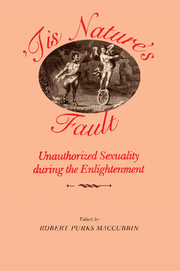Book contents
- Frontmatter
- Contents
- Introduction
- “The Secrets of Generation Display'd”: Aristotle's Master-piece in Eighteenth-Century England
- Sexual Imagination as Revealed in the Traité des superstitions of Abbé Jean-Baptiste Thiers
- Married but not Churched: Plebeian Sexual Relations and Marital Nonconformity in Eighteenth-Century Britain
- Moral Values in “La Suite de l'Entretien”
- Prostitution and Reform in Eighteenth-Century England
- The Properties of Libertinism
- Between the Licit and the Illicit: the Sexuality of the King
- The Sublimations of a Fetishist: Restif de la Bretonne (1734-1806)
- Sodomitical Subcultures, Sodomitical Roles, and the Gender Revolution of the Eighteenth Century: The Recent Historiography
- The Priest, the Philosopher, and Homosexuality in Enlightenment France
- The Pursuit of Homosexuality in the Eighteenth Century: “Utterly Confused Category” and/or Rich Repository?
- Sodomy in the Dutch Republic during the Eighteenth Century
- Parisian Homosexuals Create a Lifestyle, 1700-1750: The Police Archives
- The Censor Censured: Expurgating Memoirs of a Woman of Pleasure
- Chthonic and Pelagic Metaphorization in Eighteenth-Century English Erotica
- Modes of Discourse and the Language of Sexual Reference in Eighteenth-Century French Fiction
- The Mélange de poésies diverses (1781) and the Diffusion of Manuscript Pornography in Eighteenth-Century France
- Obscene Literature in Eighteenth-Century Italy: an Historical and Bibliographical Note
The Priest, the Philosopher, and Homosexuality in Enlightenment France
Published online by Cambridge University Press: 06 July 2010
- Frontmatter
- Contents
- Introduction
- “The Secrets of Generation Display'd”: Aristotle's Master-piece in Eighteenth-Century England
- Sexual Imagination as Revealed in the Traité des superstitions of Abbé Jean-Baptiste Thiers
- Married but not Churched: Plebeian Sexual Relations and Marital Nonconformity in Eighteenth-Century Britain
- Moral Values in “La Suite de l'Entretien”
- Prostitution and Reform in Eighteenth-Century England
- The Properties of Libertinism
- Between the Licit and the Illicit: the Sexuality of the King
- The Sublimations of a Fetishist: Restif de la Bretonne (1734-1806)
- Sodomitical Subcultures, Sodomitical Roles, and the Gender Revolution of the Eighteenth Century: The Recent Historiography
- The Priest, the Philosopher, and Homosexuality in Enlightenment France
- The Pursuit of Homosexuality in the Eighteenth Century: “Utterly Confused Category” and/or Rich Repository?
- Sodomy in the Dutch Republic during the Eighteenth Century
- Parisian Homosexuals Create a Lifestyle, 1700-1750: The Police Archives
- The Censor Censured: Expurgating Memoirs of a Woman of Pleasure
- Chthonic and Pelagic Metaphorization in Eighteenth-Century English Erotica
- Modes of Discourse and the Language of Sexual Reference in Eighteenth-Century French Fiction
- The Mélange de poésies diverses (1781) and the Diffusion of Manuscript Pornography in Eighteenth-Century France
- Obscene Literature in Eighteenth-Century Italy: an Historical and Bibliographical Note
Summary
Modern study has defined sexuality mostly in terms of norm and perversion, model and deviance. In response to this dominant discourse, which gives itself out as medical truth and moral rule, a challenging discourse accepts the category, sexuality, but nevertheless considers sexuality in terms of freedom and repression. Either mode of discourse, however, makes homo- and heterosexuality mirror notions. Whatever the limits of some of Michel Foucault's analyses, and of this taste for paradoxes, we can credit him both with pointing out the inadequacy of contemporary categories to explain attitudes and practices of past centuries and with freeing ourselves from moral oppression. To Foucault, although industrial, or bourgeois, society appears to have led a great crusade against sex (with all the real suffering this has meant for individuals), nevertheless it has attributed to sex the means of expressing individual truth, as in an outpouring of emotions which express the speaker's honesty, thus making sex the source of power and pleasure. Therefore, one should renounce both the “repressive hypothesis” and, in order to escape the dominant discourse, renounce the very category, sexuality. Classical antiquity showed how to use the body's pleasures without polarizing them as homo- or heterosexual. Although Greek literature addressed the debate between love for women and love for boys, the conceptual couple that organized Greek moral life was composed of active and passive halves. The homosexual was not opposed to the heterosexual; rather active man was opposed to the three possible figures of passivity in classical thought: woman, slave, and adolescent.
- Type
- Chapter
- Information
- 'Tis Nature's FaultUnauthorized Sexuality during the Enlightenment, pp. 122 - 131Publisher: Cambridge University PressPrint publication year: 1988
- 4
- Cited by



